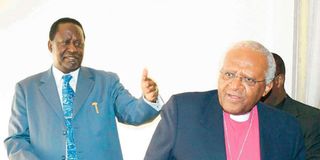How Tutu’s arrival in Nairobi unlocked ‘07 poll row standoff

ODM leader Raila Odinga (left) and Archbishop Desmond Tutu after holding talks in Nairobi on January 3, 2008, to resolve the post-election dispute. The Archbishop later said President Kibaki and Mr Odinga were willing to consider talks on forming an all-inclusive government.
Kenya was teetering on the brink of anarchy. Dozens had been murdered, thousands displaced and initial mediation efforts following the disputed 2007 presidential polls had caved in.
The situation was quickly turning into the worst humanitarian crisis witnessed in post-independence Kenya.
When South African Archbishop Desmond Tutu arrived in Nairobi in the first week of January 2008, he had one mission: to convince President Mwai Kibaki and his main challenger Raila Odinga to give dialogue a chance, lest the country plunged into civil war.
A respected mediator of international standing and an anti-apartheid hero, Archbishop Tutu had participated in and helped to resolve numerous socio-political stalemates across the continent and in the world, notably in Sudan’s Darfur War, Middle East, Ivory Coast, Cyprus and Ethiopia.
His arrival was a breath of hope among Kenyans devastated by the chaos, and even the international community was calling for the swift end to the violence that tore through the country, leaving more than 500 dead.
Tutu couldn’t fail in his mission. A few days earlier, then Africa Union (AU) chairperson and Ghana President John Kufuor, US Assistant Secretary Jendayi Frazer, four former African presidents and a host of diplomats had visited the country, raising hopes for political reconciliation.
The AU mission led by Kufuor would, however, topple over as the government and opposition camps accused each other of wrecking talks with ‘‘unreasonable’’ demands.
Tutu would later hold talks with both Kibaki of the Party of National Unity (PNU) and Odinga of Orange Democratic Movement (ODM).
After days of tough demands, the wisdom and charisma of the Nobel laureate prevailed upon the leaders, who agreed to put the country before their own interests.
‘‘Both the President and Mr Odinga have assured me that they are willing to enter into talks for the sake of peace in the country. That’s the way to go,’’ said Tutu after the first notable breakthrough. He even expressed confidence that ‘‘violence will soon come to an end.’’
Added he: ‘‘They should not wait for Parliament to be convened for this initiative to begin. It should be immediate.’’
Noting that woman and children were suffering as a result of the deadly chaos, Tutu asked the two sides to ‘‘put their acts together for the sake of peace.’’
Two weeks later, chief mediator Kofi Annan would arrive in Kenya hoping to take over from where Tutu had left. At the time, the violence had escalated with nearly 1,000 people already killed and more than 300,000 displaced from their homes.
Meanwhile, the international community continued to pile pressure on Kenya to end the standoff without success.
Mr Annan’s efforts to meet the two protagonists were thwarted when Kibaki opted instead to engage Uganda President Yoweri Museveni in a broader effort to seek a ‘‘local solution’’.
The government side was hell-bent on keeping at bay the international community’s involvement in the affair.
Mr Odinga’s ODM was on its part demanding for an ‘‘international mediation’’ approach, according to revelations contained in a study titled A Search for Peace: The Story of 41 days of Mediation in Kenya. The study was done by Columbia University scholars Elisabeth Lindenmayer and Josie Lianna Kaye.
When the two parties finally agreed to talk, another deadlock arose: each of them wanted to have an upper hand in the dialogue, according to the study.
The PNU side, for instance, had rejected the suggestion by Mr Annan to appoint South Africa’s Cyril Ramaphosa (now president) as a negotiator in his place, claiming that he was an ally of the ODM leader, Mr Odinga.
Where Kufuor had failed, Annan made some headway. But it was the seed sown weeks earlier by Archbishop Tutu to abandon hard-line stances and to embrace dialogue that was the beginning of the journey to restore calm in the country, culminating in the formation of the Grand Coalition Government.
It’s difficult to tell the story of Kenya’s quest for democracy without narrating the role played by the South African clergyman. The Anglican Archbishop of Cape Town visited Kenya on multiple occasions in the 1990s at the height of quest for multiparty democracy.
During one such visit in March 1990 where he spoke at the All Saints Cathedral in Nairobi, Archbishop Tutu slammed African ‘‘dictators and despots’’, arguing that their countries fared worse than during colonial times.
In another visit in 1993, he challenged Kenyans to reject politicians who were attempting to introduce ‘‘tribal apartheid’’ in the country.
‘‘In Jesus Christ, there’s no Kikuyu, Luo or Kalenjin. In Jesus Christ, we’re all one…the children of God,’’ he told a congregation at Kisumu’s Moi Stadium during an ecumenical service.
Two years later, Tutu was in Nairobi again, where he accused ‘‘corrupt’’ military regimes in Africa, noting that they were perpetrating more anarchy in their countries than restoring order.
A fierce human rights defender, the retired Anglican archbishop commended Kenya in 2003 for her courage to deal with her past.
This was after the Narc government constituted the Truth Justice and Reconciliation Commission (TJRC) to investigate and document injustices and human rights abuses perpetrated on Kenyan soil since independence.
Tutu had himself chaired his country’s version of a similar commission five years earlier, the Truth and Reconciliation Commission, established in 1996 to investigate cases of brutality meted on South Africans during the apartheid rule. Tutu is often regarded as Africa’s top peacemaker.
Writing in the Sunday Nation in September 2000, Prof Ali Mazrui described him as one of the most famous moral activists in black world in 100 years, alongside American civil rights activist Martin Luther King Jr.





